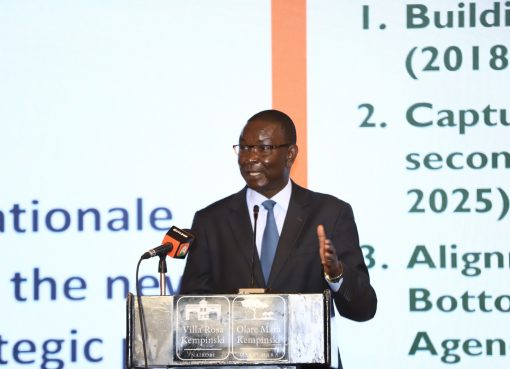Fight against cervical cancer in Migori County has been boosted after an international health organisation donated 36 pieces of equipment that can detect and treat the cancer cells at an early stage.
Clinton Health Access Initiative (CHAI) and Nuru ya Mtoto that is supported by the United States Agency for International Development (USAID) donated cancer screening equipment’s that aims to detect and treat cervical cancer cells.
County health officials who spoke during the launch of the equipment stated that the equipment will save several women who are diagnosed with cancer every year.
Migori Governor, Zachary Obado, want girls under the age of 15 years to be immunised with the (HPV) Human Papilliomavirus to prevent cervical cancer.
“If detected earlier the cervical cancer is the easiest to treat as compared to other types of cancers,” said Obado.
Obado stressed that the county was targeting to screen up to 70 per cent of reproductive women. He, however, said that the biggest challenge was stigmatisation of women living with cervical cancer and encouraged society to embrace the victims.
He stated that with better cancer-detecting equipment, earlier screening, campaign awareness, a proper diet and frequent exercising, the Migori population will be in a better position to fight cancer and ensure a healthier society.
The Governor encouraged the residents to use the County Referral Hospital established facilities like the amenity wards instead of health facilities outside the county.

“Going to Nairobi or other counties for health services that can be found here is not only costly but also unnecessary. Let’s market our own health facilities,” said Mr. Obado.
The County executive Officer for health Col (Rrd) Kepha Nyamita stressed that the newly donated equipment’s will help in screening reproductive women in all the 8 sub-counties of Migori.
Nyamita, however, reiterated that stigmatisation that surrounds people leaving with cancer should be discouraged.
“Let us support the victims so that they can get faster treatment and leave happy lives just us a normal person,” said Nyamita.
Chief Officer Public Health, Pauline Amolo, said that after the launch of the rapid response initiative in 2019 some 10,563 reproductive women have been screened in all the 118 health centres which represented 14 per cent of the total population. She said that out of the 10,563 screened, 143 had tested positive for the cancerous cells.
Ms. Amolo stated that the screening was free of charge and encouraged women to visit all the 118 health centers for screening. She pointed out that so far they have 6 nurses for palliative care.
She said that 32,933 reproductive women were living with HIV and were more vulnerable to get cervical cancer.
Speaking at the same time, Paul Olick, the Head of Communicable diseases Migori County Referral Hospital blamed early exposure to teen sex and multiple unprotected sexual partners among adults as leading contributions to cervical cancer.
By Geoffrey Makokha and Geoffrey Satia





